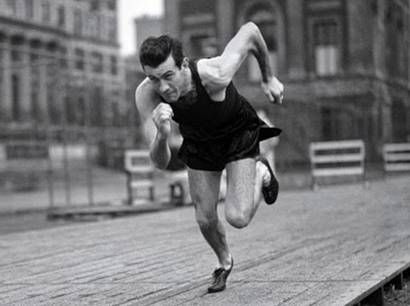This Week's Story
Louie Zamperini was a track wonder--running at USC, NCAA, and 1936 Olympics in Berlin.

This Week’s Story relives American history and the Bible through brief inspiring stories presented on mp3 audio recordings and text for reading.
Louie Zamperini, more than a moment of pain, part one
There was a knock. Louie opened his hotel door to see a Notre Dame Coach looking seriously at him. He wondered, “Why is a coach from the NCAA competitions here?”
“Louie, you have runners determined to keep you from winning tomorrow. Some of their coaches have ordered them to sharpen the spikes on their track shoes so they can smash a spike into your foot.”
Louie protested, “I don’t think any of my opponents would do that.”
The coach replied, “True for some, but not all! My team wants to defeat you and your University of Southern California team, but not this dirty way. We need a fair race, even if it means you win it. Maybe you’ll give us the impossible: a mile in four minutes.”
“Thanks, Coach, and good luck to your guys.”
The next day the race began with two smooth laps for Louie. Then
runners boxed him in. One slammed his shoe into Louie’s foot, driving a spike into it, and ripping his shoe. A runner in front of him kicked back, cutting Louie’s shins. A third runner elbowed Louie so hard that one of his ribs cracked.
For a lap and a half he could not get free. Then he broke loose, past the other runners on the last turn. His time was 4:08.3—the fastest NCAA mile in history. His record stood for fifteen years.
Louie Zamperini was a wonder on the track. By age 17, he was the fastest high school miler in American history. By age 19 he was competing in the 5,000 meter in the 1936 Olympics in Berlin, Germany. The Berlin Olympics were calm, but they occurred in a country preparing for war. Gestapo soldiers patrolled events. Military units drilled publicly and Nazi banners plastered the walls of buildings. American Jesse Owens was a highpoint to the competitions, winning four gold medals in racing.
Hitler sat in the stands as Louie ran in the final heat of the 5,000 meter. Nausea started slowing him when an almost over-powering odor came from a nearby runner. As he neared the final lap words from his brother Pete pounded into his brain. “A lifetime of glory is worth a moment of pain.” His speed rapidly accelerated. He lost the race, but he ran the last lap in 56 seconds. It was an unheard of achievement.
After the Olympics on a sports’ scholarship Louie enrolled at the University of Southern California. His training focused on competing in the 1940 Olympics, where surely he would win at least one gold medal. Then war exploded in Europe and China. The Olympics were cancelled. Louie began losing races. He left school at the end of a semester, a few credits short of his degree. History began racing as war became a blitzkrieg. Louie was soon in the Army Air Corps training to be a bombardier.
Horror struck December 7, 1941. Three hundred and fifty-three Japanese fighters, bombers and torpedo planes attacked the United States naval base at Pearl Harbor, Hawaii. The next day the United States declared war against Japan.
Louie was soon assigned to be the bombardier of a B-24 Liberator, a plane despised by airmen for its problems. It had many nicknames, one being the “the Constipated Lumberer.” It was one of the heaviest planes in the world, hard to fly, and clumsy.
Four months after the United States entered World War II Louie and his crew went on a rescue mission in a B-24. Their plane crashed into the Pacific Ocean. Eight crew members died. Louis and two other members drifted in two small rafts, until one was destroyed. After 33 days one man died. Forty-seven days passed; fighting off shark-attacks, storms, and struggling to get food and water. We will hear that extraordinary story next week.
This is Barbara Steiner examining preparedness for challenges.
Please check out thisweeksstory.com.
<< previous story] [next story >>
We invite your comments! [click here to comment]
This Week's Story is a non-profit supported by listeners. [click here to make a donation]
 click here to play audio
click here to play audio